What does client involvement mean for a medical business? Should you even care to invest in patient engagement chatbots to elevate it? Imagine this: your customers feel heard, supported, and empowered at every step of their journey—from booking appointments and getting quick info on their conditions to checking symptoms and receiving medication reminders. Sounds great, right? And that’s just the beginning.
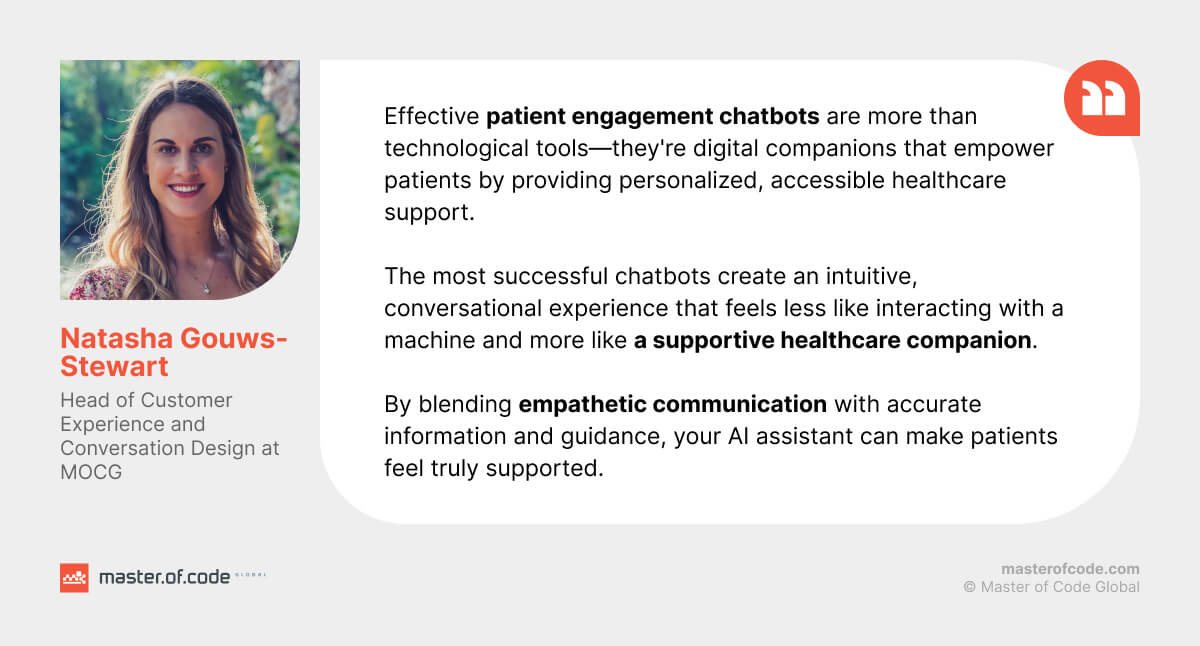
When patients experience this level of service and convenience, they choose YOU over other clinics and recommend your brand to everyone they know. It’s a win-win: you boost engagement, receive excellent feedback, automate processes, and enhance care outcomes—all thanks to the power of well-designed AI agents.
Still hesitant? Let’s see how AI and chatbots improve patient interactions in practice and unlock 18 potential advantages for your healthcare company with Natasha Gouws-Stewart, our Head of Customer Experience and Conversation Design.
Table of Contents
6 Impactful Applications of Patient Engagement Chatbots
Ready to dive into specifics? We’ll explore how AI assistants are transforming care in various scenarios, from simplifying appointment scheduling to delivering personalized health information. And if you are willing to go even deeper, check out our guide on healthcare Generative AI use cases. Let’s kick things off!
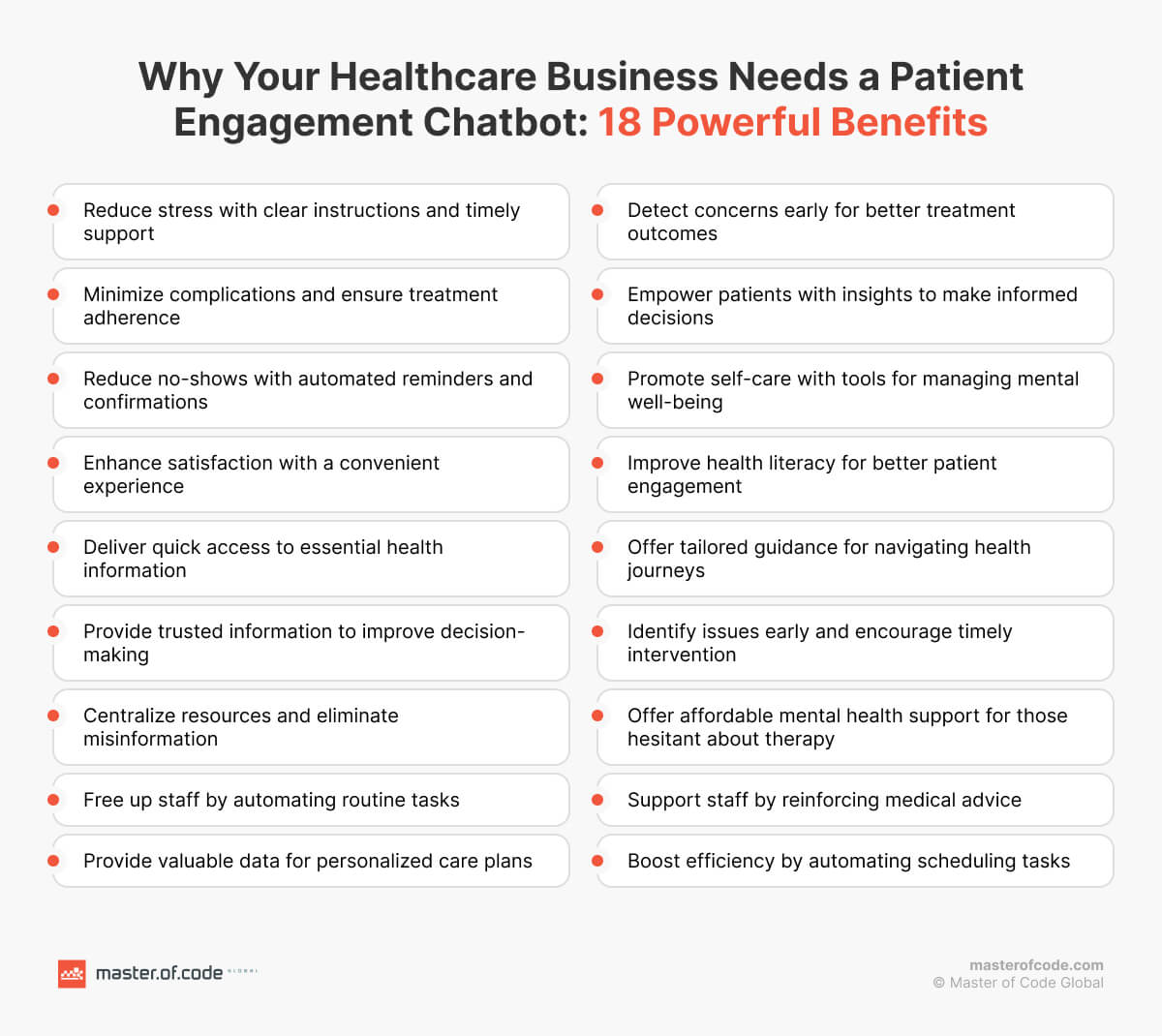
1. Pre- and Post-Surgery Guidance
Surgery can be a stressful experience for patients and their families. A medical chatbot can act as a dedicated companion for individuals, guiding them through every step of the process. Before the procedure, it reminds about pre-op preparations, such as fasting guidelines and prescription details. After surgery, the AI agent ensures people adhere to aftercare programs by sending alerts for medication schedules, check-up visits, and essential healing tips.
Problems addressed:
- For patients: Pre-surgery anxiety, confusion about pre-operative requirements, difficulty adhering to aftercare interventions.
- For care providers: Time-consuming care coordination, communication challenges, managing post-operative setbacks.
Benefits:
- Increase satisfaction and reduce stress by providing clear instructions and timely support.
- Minimize complications and promote adherence to the prescribed treatments.
- Automate routine tasks and interactions, freeing up healthcare staff for more critical duties.
Real-world example:
To see this in action, watch our demo video of a post-surgery bot. It showcases how these AI assistants can ask patients about their symptoms, provide personalized recommendations, schedule follow-up appointments, and send vital reminders.
2. Symptom Tracking and Health Monitoring
Imagine having a personal health assistant available 24/7 to monitor your state, answer questions, and provide practical insights into your well-being. That’s precisely what a symptom-tracking chatbot offers. It empowers patients to take control of their well-being and reduces the burden on health practitioners.
Problems addressed:
- For providers: Challenges with remote monitoring and managing individuals with chronic conditions.
- For patients: Struggling to recognize symptoms, uncertainty about seeking medical attention, delayed diagnosis.
Benefits:
- Recognize potential medical concerns early on, allowing for on-time treatment and better outcomes.
- Gain a deeper understanding of patients’ health, enabling them to make informed decisions and actively participate in their care.
- Receive valuable data that can be shared with healthcare providers, leading to more personalized and effective therapy plans.
Real-world example:
In the early days of the COVID-19 pandemic, the Cleveland Clinic launched an AI-driven online screening tool. This instrument attracted 145,000 users nationally in its first six weeks and helped identify individuals at high risk, who were then advised to seek further medical consultation.
To ease growing patient support demands, Master of Code Global implemented an AI concierge chatbot for a leading healthcare provider. Deployed directly on their website, the assistant quickly became the first point of contact for patients—handling appointment questions, service inquiries, and department routing. Within weeks, it significantly reduced pressure on the call center while speeding up response times across the board.
See how AI is redefining patient care with chatbots in healthcare settings.

3. Appointment Assistance
Scheduling a doctor’s appointment can be as easy as ordering a ride or booking a table at a restaurant. An AI-powered patient chatbot seamlessly integrates with a medical facility’s internal systems, allowing people to book, reschedule, or cancel consultations 24/7, without the wait.
Problems addressed:
- For patients: Phone system inconveniences, long wait times, limited slot availability.
- For providers: Inefficient scheduling management, check-up conflicts, missed appointments.
Benefits:
- Lessen the number of no-shows and ensure timely care by providing automated reminders and confirmations.
- Boost client satisfaction by offering a convenient and user-friendly experience.
- Raise efficiency for healthcare providers by automating administrative tasks.
Real-world example:
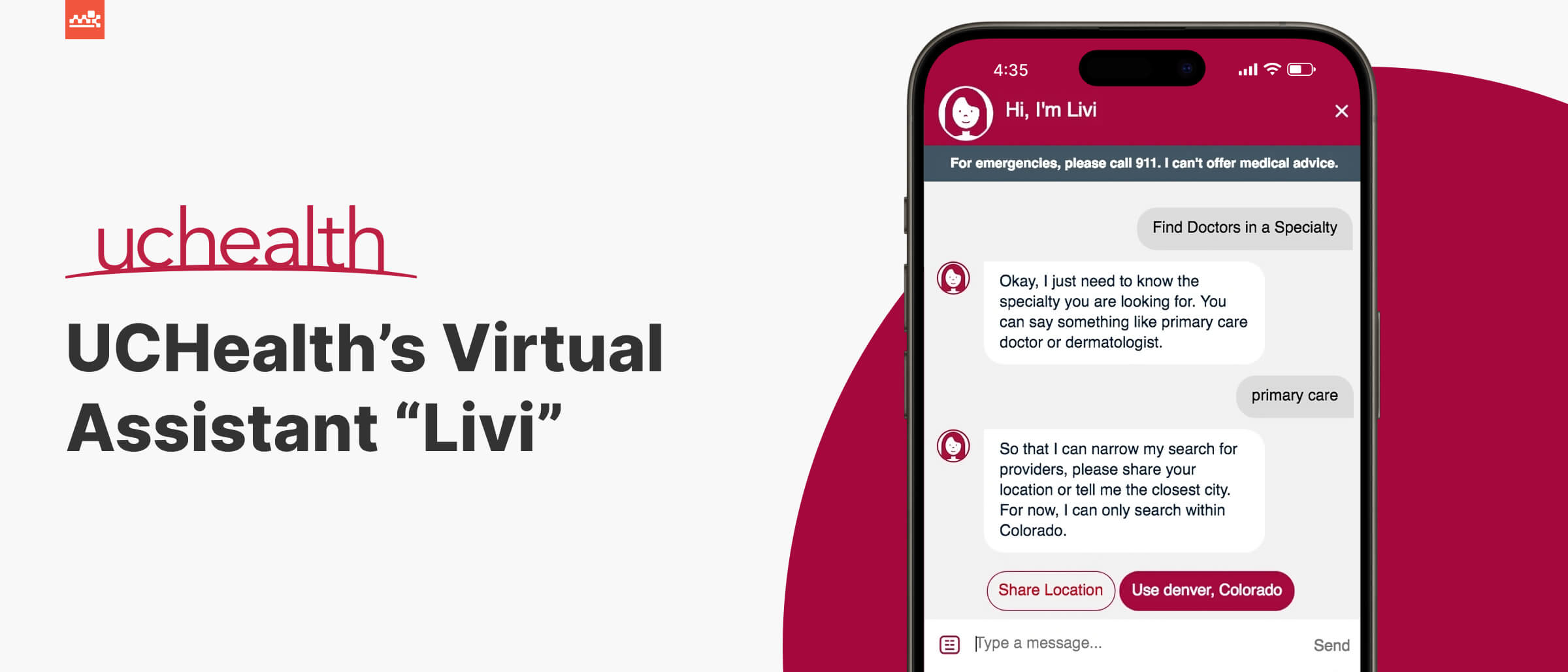
UCHealth’s virtual assistant, “Livi,” uses Conversational AI to help patients find doctors, schedule visits, and obtain health information through smart speaker devices. This innovative tool enriches interaction and raises accessibility, contributing to a positive image of the hospital.
4. Health Education and Lab Result Support
Deciphering medical jargon and interpreting tests can often feel like learning a foreign language. The solution – a health education AI assistant. It bridges this communication gap, offering straightforward explanations and personalized assistance to empower patients and their caregivers. It transforms complicated clinical data into digestible knowledge, fostering educated decision-making.
Problems addressed:
- For providers: Time constraints and urgency for simplifying communications around these topics.
- For patients: Confusion and anxiety related to complex terminology, lab results, and treatment options.
Benefits:
- Increases literacy and empowers patients to actively participate in their care, leading to better outcomes and reduced expenses.
- Provides convenient and accessible info, eliminating the need for time-consuming research and reducing reliance on healthcare providers for basic questions.
- Delivers tailored aid and guidance, helping people navigate their health journey with confidence.
Real-world example:
Northwell Health integrated an AI-based pregnancy chatbot that shares specific information and supports women during and after pregnancy. This tool has been effective in identifying urgent issues and providing timely intervention, demonstrating the value of chatbots in patient education and safety.
5. Access to Credible Disease-Related Information
Patients and healthcare providers share a common challenge: accessing trustworthy data about specific diseases. While the internet offers a wealth of medical content, its reliability and clarity often vary. AI agents equipped with robust knowledge bases provide individuals with effortless access to verified details about their conditions, therapy options, and support networks, all through an intuitive and accessible channel.
Problems addressed:
- For patients: Difficulty locating dependable and easily understandable facts, resulting in confusion, stress, and exposure to misinformation.
- For healthcare providers: Limited time to thoroughly educate people on their condition, which may hinder evidence-driven decisions and effective collaboration.
Benefits:
- Empowers individuals with accurate and clear insights, helping them make confident choices and engage more effectively in shared decision-making.
- Centralizes reputable materials, eradicating time-consuming web searches and easing confusion or worry.
- Supports staff by acting as a supplementary tool, reinforcing medical advice, and encouraging adherence to treatment plans.
Real-world example:
Master of Code Global developed an AI-powered cancer awareness bot for CSource to tackle the problem of finding reliable disease-related information. This chatbot facilitates quick access to verified resources, personalized guidance, and emotional help, streamlining their care journey.
6. Mental Health Support
Mental health is equally as vital as physical well-being, yet many face barriers to accessing support due to stigma, resource constraints, and geographical limitations. To address this, medical brands are implementing confidential and convenient conversational solutions. These chat assistants equip people with coping mechanisms, self-help tools, and the possibility to reach out to a specialist when required.
Problems addressed:
- For providers: Restricted resources and time to provide thorough guidance to all patients. Challenges with early identification and intervention for psychological concerns.
- For patients: Trouble with locating mental health services due to cost, discrimination, or lack of availability. May also struggle with self-management of such conditions.
Benefits:
- Offers a discreet and affordable way to receive support, particularly for those hesitant to pursue traditional therapy.
- Empowers self-care, presenting tools and strategies for people to manage their state effectively.
- Identifies potential issues early and motivates individuals to seek professional consultations for timely interventions.
Real-world example:
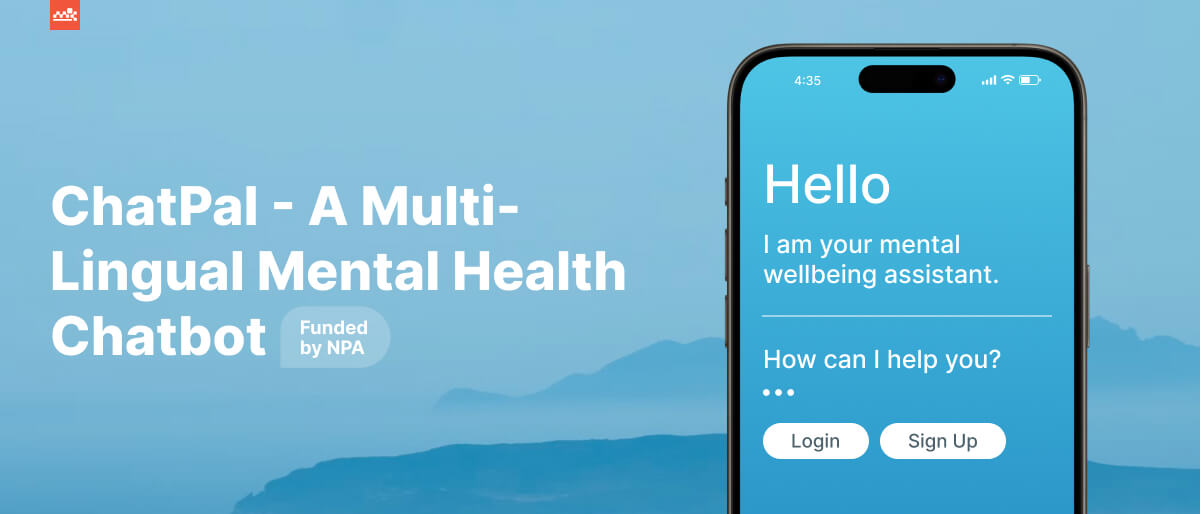
ChatPal, a multilingual chatbot, supports mental well-being in rural regions with limited access to psychological aid. It provides assistance and recommendations to improve emotional wellness, demonstrating how chatbots can make care more inclusive and accessible.
Wrapping Up
Patient engagement chatbots don’t just automate tasks; they bridge gaps in accessibility, enrich communication, and empower individuals to take charge of their health. From scheduling appointments to managing mental well-being, these AI agents are redefining the healthcare experience while enabling providers to focus on delivering compassionate, high-quality care.
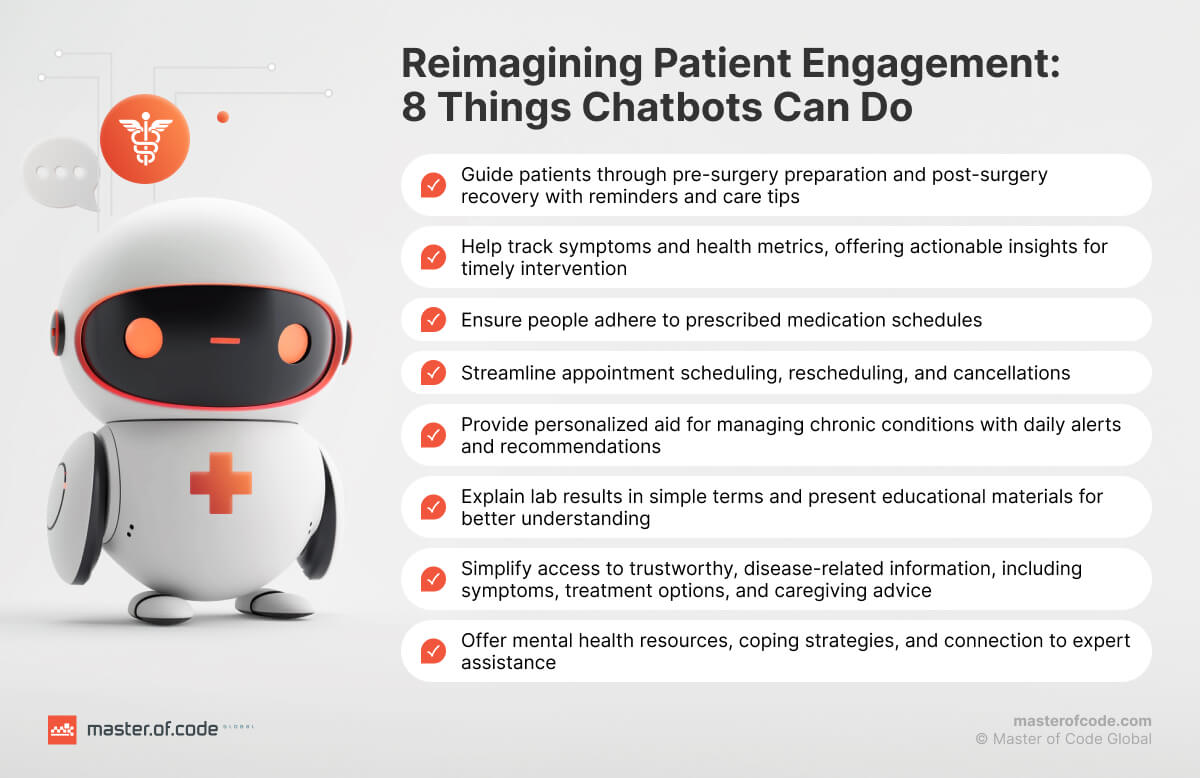
At Master of Code Global, we understand that while technology is essential, the human touch remains irreplaceable. Our customized chatbot solutions are designed to enhance—not replace—human interaction. Our healthcare bot development service is designed to enhance—not replace—human interaction.
By automating routine processes and providing instant, reliable information, we help businesses create meaningful, efficient, and patient-centered experiences.
We also recognize that budget is a crucial factor in any technology investment, so be sure to check out our guide on the cost of AI in healthcare to learn more about the factors that influence pricing.
Our expertise also ensures your built-from-scratch intelligent solution meets the highest standards of quality by:
- Defining specific use cases and aligning the bot with your healthcare business demands.
- Segmenting target users to personalize conversations and meet their unique needs while guaranteeing HIPAA compliance for chatbot interactions.
- Prioritizing user-friendly design and clear navigation for a seamless digital journey.
- Balancing automation and human support to address diverse inquiries effectively.
- Planning for multi-channel availability to reach patients on their preferred platforms.
- Training your staff to utilize, monitor, and sustain the AI agent for optimal performance.
- Facilitating ongoing maintenance to ensure your tool is up-to-date and effective.
Ready to take the next step? Let’s arrange a free consultation, discuss your objectives, and discover how a tailored Conversational AI-powered solution can transform your engagement strategy.
Ready to build your own Conversational AI solution? Let’s chat!






